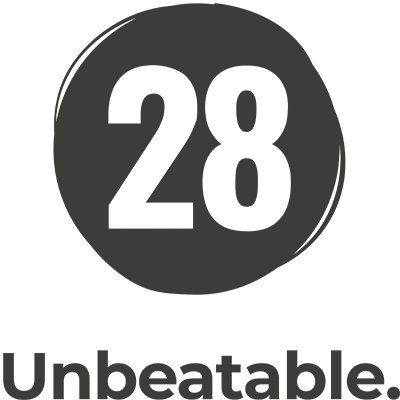Over the years there have been many diet trends gain popularity regardless of lack of scientific evidence. Let’s be honest, any diet can work – if short term weight loss is what you are looking for. However, studies show that when it comes to long term weight maintenance to keep the weight off, these diets aren’t sustainable so people are more likely to gain the weight back… plus extra!
Here are the top 5 of the worst diet tips from 28’s Head Nutritionist, Steph Geddes.

Bad diet tip #1: You must not exceed 1200 calories per day to lose weight
Essentially what this is implying is that all calories are made equal so no matter what food you eat in a day, so as long as it comes in under 1200 calories you will lose weight.
Two things could happen if you limit yourself to 1200 calories:
- You lose weight because you are drastically reducing your calorie intake. However, you won’t continue to lose weight if you’re not getting the balance of nutrients your body requires to function optimally. If all you eat is bread and chocolate to get to your 1200 calorie limit then you will be missing out on vital nutrition and eventually, your body won’t continue to lose weight or maintain optimal weight.
- Your body decides you are starving because, in your specific case, 1200 calories are insufficient to maintain all your body’s functions, so it will begin to hold onto whatever energy you have in order to survive, hence weight loss will not occur. A diet of 1200 calories may aid in weight loss for some individuals whom that amount of energy is sufficient for however, it is essential that this diet is nutritionally balanced for macro and micronutrients for long term results.
It is important that you look at where your calories are coming from, rather than just how many you are having.
Bad diet tip #2: Stick to a low-fat diet to lose fat.
Thankfully, we now know that although there was a shift towards a low-fat diet previously, more recent studies have shown that there is no significant evidence showing that saturated fat is associated with an increased risk of heart disease. In fact, the reason it took so long for this research to come out was that the sugar industry did their best to hide evidence that sugar is, in fact, the culprit when it comes to heart disease risk.
READ: Why You Should Eat Fat To Lose Fat
We should always aim to eat foods that have gone through the least amount of processing and, unfortunately, low-fat options go through additional processing to make them ‘low fat’. This often involves adding sugar or other additives to replace the flavour and mouthfeel of the fat. You typically lose many of the important nutrients during this processing. So my advice is: ignore any label that says low fat and always opt for the full-fat products for maximum nutrition.

Bad diet tip #3: Cut carbs at all costs
This is an interesting one because technically most people consider 28 a low carb meal plan. However, in my opinion, low carb isn’t ‘low’. It should be considered the norm. Our portions have become distorted over the last 30 years, with many people now eating huge big bowls of pasta or risotto and thinking this is normal. It isn’t.
Cutting carbs completely can send your body into ketosis. Ketosis is when your body is burning fat as your energy source, and ketones are released into your bloodstream in the process.
Permanent fat burning might sound great, but there are three big disadvantages to the low carb/keto approach.
- You need to eat next to no carbohydrate to remain in ketosis.
- You’re limiting your fibre sources and fibre is important for gut health.
- If you remain at a high level of ketosis (as can be measured by the level of ketones in your urine) you might send your body signals that it is in starvation so, eventually, it might do the opposite of what you want and start holding onto any excess weight.
We want you to have the health benefits of all kinds of quality nutrients and fibres, including carbs, but without overdoing it, so you don’t store excess energy as body fat.
For these reasons, our approach at 28 is to achieve sustainable weight loss by eating complex good quality carbohydrates as part of a healthy, balanced diet.

Bad diet tip #4: You need to “juice” to detox
Juicing can be a healthy addition to one’s diet but when it comes to detoxing, our body needs much more than what juice can provide to rid of toxins successfully.
Juicing is essentially like concentrating the nutrients in foods into a liquid and you also get some enzymes in there if you consume it straight away. However what it doesn’t give you is fibre and protein which are two essential factors for the body’s detoxification pathway.
If detoxing is your aim then your best bet is to stick to a very clean wholefood diet to get the fibre and protein that you need, and that can include juices as snacks if you wish.

Bad diet tip #5: Skip a meal to save calories
This can be a common one when weight loss is the main goal however doing this can have the opposite effect to what you want.
Skipping an entire meal will drastically reduce the number of calories you are consuming and this can lead your body to think you are starving it and it will then begin to switch on processes that mean you hold onto whatever energy you have in order to survive, one of the main ones being a signal to your thyroid to slow metabolism, and hence weight loss will not occur.
Skipping a meal can often mean that you overcompensate later in the day. You may have skipped a meal (and calories) at lunchtime but that is pointless if you then end up eating double the portion size at dinner or going for a processed food option for quick satisfaction.

A COMMON MYTH ABOUT INTERMITTENT FASTING
Many people believe that intermittent fasting involves skipping a meal because you don’t start eating until later in the morning however it is important to note that the correct way to fast is actually to eat the same amount of food, just in a smaller time period. This means you are not going without, so much as limiting when you will eat your normal amount of food.


